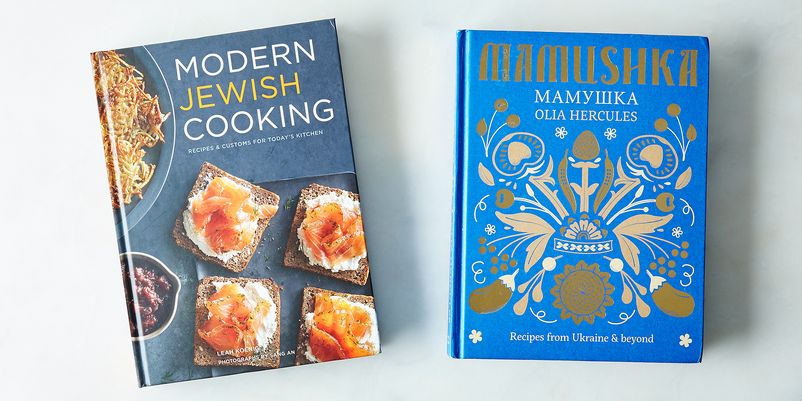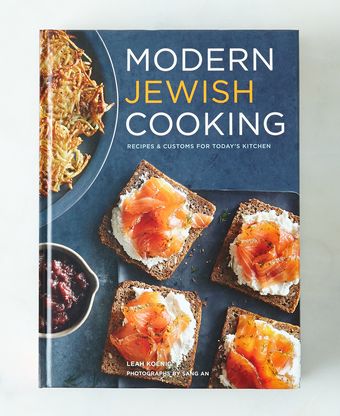Writing what follows was more stressful than Claire and I thought it would be. This stems partly from the fact that my business partner and I (we went halvsies on this cookbook testing project, as we do with a whole lot of things in life) have a “don’t go negative” policy when it comes to posting on the internet and our own website, Of a Kind.
The other dose of trepidation can be attributed to the fact that the books we were assigned to critique—Modern Jewish Cooking and Mamushka—are both rooted in cultures and customs and histories, important things that neither one of us felt educated enough about. Making this pronouncement suddenly felt like a lot of pressure.
I’ll start first with our lacking qualifications: Claire, while Jewish, might have experienced her first Passover Seder during college when I, her half-Jewish friend, presented a version of the sacred ritual where Sour Patch Kids stood in for parsley and salt water. We might not be in a position to judge what would make something feel “authentically” Jewish. We do, however, have a good amount of experience dining at Russ & Daughters Café and would like credit for that.
As for our Ukrainian chops: I have none (unless you count having a half-Ukrainian uncle, which you probably shouldn’t), and Claire has some (though I didn’t learn this fact until this book and its very pretty gilded cover slid across our desk).
If you judge by their covers, which Claire and I do because we like aesthetically pleasing things and also because we are human, Mamushka takes the cake. You want it sitting on your coffee table. You want your house guests to spot it and think you’re way ahead of culinary trends—that you know everyone will be all about kefir dough, sour eggplants, and mutton with cilantro in 2017. We were rooting for it out of the gate.
But opening the book made us feel pretty quickly like outsiders—we wanted more context than the glimpses we got to be lured into the food of author Olia Hercules’s childhood. For starters, there’s the title, which I had assumed was a word in a language I do not speak; I discovered after I read the introduction, though, that it’s a reference to The Addams Family movie (of all things) that was co-opted as a nickname for the author’s mother. By page six, I was a little lost.
Claire and I tested the recipes from both books by cooking from them with our husbands and then bringing leftovers for each other for lunch (shout-out, Not Sad Desk Lunches!). One Monday, Claire served up Mamushka’s Mushroom Broth with Buckwheat. It was nice, if a little flat—and it might have been better had it contained the whole grain instead of buckwheat flour, like we used. (The recipe just called for "buckwheat.") This is one of those things that would probably have been abundantly clear to someone who cooks with the ingredient regularly, but not to someone who was just dipping into a cuisine a little uncharted for her. As Claire puts it: “Why not put the word ‘groats’ after ‘buckwheat’ in the ingredient list?”
A bigger winner: the Azerbaijani Chicken with Prunes and Walnuts (and sumac too—bring on that tang). The recipe was alluring and accessible enough to motivate Claire to stuff a roast chicken for the first time, and the successful mix of the sweetness of the dried fruit, the nuttiness of the, er, nuts, and the depth of the grated red onion made her want to do it again—which will be an easy thing to achieve since she now has a ready supply of prunes on her hands and not a lot of tempting ways to use them.
Though the exterior of Modern Jewish Cooking does less to bait you, the introduction works hard to contextualize author Leah Koenig’s broad and longstanding interest in Jewish cuisine in all of its various forms: This isn’t a book just about Eastern European comfort food— it’s also one that represents Sephardi Jews from the Iberian Peninsula, and Mizrahi Jews with roots in the Middle East. Koenig makes sure you have that understanding going in—a welcome thing for readers less versed in her cuisine, her culture, her food.
In that way, the preface feels a little like required reading, but once you have an understanding of how this project was conceived, the recipes collected make more sense: They span from updates on classics like Sweet Noodle Kugel with Dried Cherries and Figs or Beef Kreplach with Ginger and Cilantro, to dishes like Roasted Eggplant and Tahini Crostini or Spinach Shakshuka that would feel at home in the world of Ottolenghi. Still, there are some that feel out of place no matter how broadly we’re defining Jewish cuisine. Does baked ziti really need to be represented here, especially when presented with no more explanation than that this sort of thing is always a crowd-pleaser?
But flipping through the book and stumbling on its curveballs is a big part of the appeal: Rather than organizing recipes by region of inspiration, the author groups them by type of dish. This is hardly a cookbook innovation, but in this case, it means you jump from matzo granola into Lemon and Rose Water Scones. Or that you flip from hummus to chopped chicken liver—and then straight into vegetarian chopped "liver" (see the word “modern” in the title). Leah’s book is more vastly cultural than straight-out-of-bubbe’s kitchen, and the format lets you experience that. It has a Where in the World Is Carmen Sandiego? bent that draws you in.
Cooking from the book felt approachable and doable on a weeknight. I kicked myself for not whipping up a bigger batch of the Carrot Salad with Mint and Dates to snack on for days. It makes you want to eat raw carrots, which is not something I say often, and it made use of ingredients I use all the time, just not together. The Saffron Rice Pilaf is a nice back-pocket side for just about any protein main, and her Tomato-Chickpea Soup with Spinach is hearty and flavorful but light enough to scratch that post-holidays itch (and easy enough to whip up at the end of a long Tuesday). Claire and I didn’t feel like we were being pushed out of our cooking comfort zones and into an unfamiliar cuisine without much guidance—instead, Koenig nudges gently with a “try it, you’ll like it!” attitude.
Modern Jewish Cooking felt cohesive in a way that Mamushka didn’t. Cooking from it was like taking a college survey course: You don’t walk away an expert, but you can hold your own. And it is just the right amount of surprising. It’s the sort of compilation that entices you to try something new—or at least new to you.



48 Comments
Hello yes! My thoughts exactly. Except I'll come out and say it "they are lazy!" Why would you substitute anything for a first time review? And you live somewhere that has EVERYTHING within arm's length. I feel very sorry for both of these authors. Thank you Le Bec Fin.